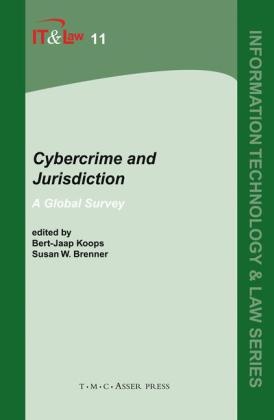Read more
Combating cybercrime requires law-enforcement expertise, manpower, legislation, and policy priorities within the ambit of crime-fighting. Because of the utterly transnational character of cybercrime, countries must focus on international investigation and prosecution. As cultural and legal traditions play a major part in countries' views on the exercise of criminal law and sovereignty, a unified approach to this phenomenon requires serious reflection. This book intends to contribute to a more concerted international effort towards effectively fighting cybercrime by offering an in-depth survey of views and practices in various jurisdictions. It includes chapters on the Council of Europe's Cybercrime Convention and on international co-operation in criminal matters. Thirteen country reports, written by experts in the field, are included in alphabetical order. The book concludes by discussing one of the most urgent steps that needs to be taken: resolving positive jurisdictional conflicts when several jurisdictions seek to prosecute a cybercriminal at the same time.
List of contents
Cybercrime Jurisdiction - An Introduction.- Jurisdiction in The Cybercrime Convention.- International Co-Operation as A Promise and A Threat.- Cybercrime and Jurisdiction In Australia.- Cybercrime and Jurisdiction In Belgium and The Netherlands. Lotus in Cyberspace - Whose Sovereignty is at Stake?.- Cybercrime and Jurisdiction In Brazil. From Extraterritorial to Ultraterritorial Jurisdiction.- Cybercrime and Jurisdiction in Chile.- Cybercrime and Jurisdiction in Denmark.- Cybercrime and Jurisdiction In Germany. The Present Situation and The Need For New Solutions.- Cybercrime and Jurisdiction In India.- Cybercrime and Jurisdiction In Italy.- Cybercrime and Jurisdiction In Japan.- Cybercrime and Jurisdiction In The Republic of Korea.- Cybercrime and Jurisdiction In New Zealand.- Cybercrime and Jurisdiction in United Kingdom.- Cybercrime and Jurisdiction in The United States.- The Next Step: Prioritizing Jurisdiction.
About the author
Bert-Jaap Koops (1967) is professor of Regulation and Technology at Tilburg University and a member of The Young Academy. He studied Mathematics as well as General Literature at the University of Groningen, and obtained a PhD in Law at Tilburg University. He researches the relation between technology (ICT, bio-, nano-, and neurotechnology) and regulation issues, focusing on digital rights, digital crime, privacy, DNA forensics, and human enhancement.
Summary
Cybercrime is remarkably varied and widespread, and financial losses range from a few hundred dollars being extorted to multi-million dollar cyberfraud cases. Increasingly, cybercrime also involves the risk of terrorist attacks bringing down a major part of the Internet. Countries are discovering that it may be impossible for them to prosecute cybercriminals. Cybercrimes, unlike ‘ordinary’ crimes, are transnational in nature and it is often difficult to say just where they take place. This causes legal problems, since jurisdiction is usually still confined to the place where the crime was committed. A related issue is to what extent the police can investigate cybercrimes across borders, through the Internet: do they infringe the sovereignty of other countries?
This book surveys how these issues in cybercrime jurisdiction are dealt with by countries around the world, including the US, Japan, Korea, India, Brazil, Chile, Australia, New Zealand, Italy,Germany, Belgium, Denmark, and the UK. A score of experts assess how well the laws of their countries and the Cybercrime Convention deal with transnational cybercrime, and how jurisdiction conflicts should be resolved. With this in-depth survey of views and practices of cybercrime jurisdiction, the authors hope to contribute to a more concerted international effort towards effectively fighting cybercrime. The book is therefore highly recommended to policy-makers, members of the judiciary, academics and practitioners.
Bert-Jaap Koops is Professor of Regulation & Technology at the Tilburg Institute for Law, Technology, and Society (TILT) of Tilburg University, The Netherlands. Susan W. Brenner is NCR Distinguished Professor of Law & Technology, University of Dayton School of Law, Ohio, US.

